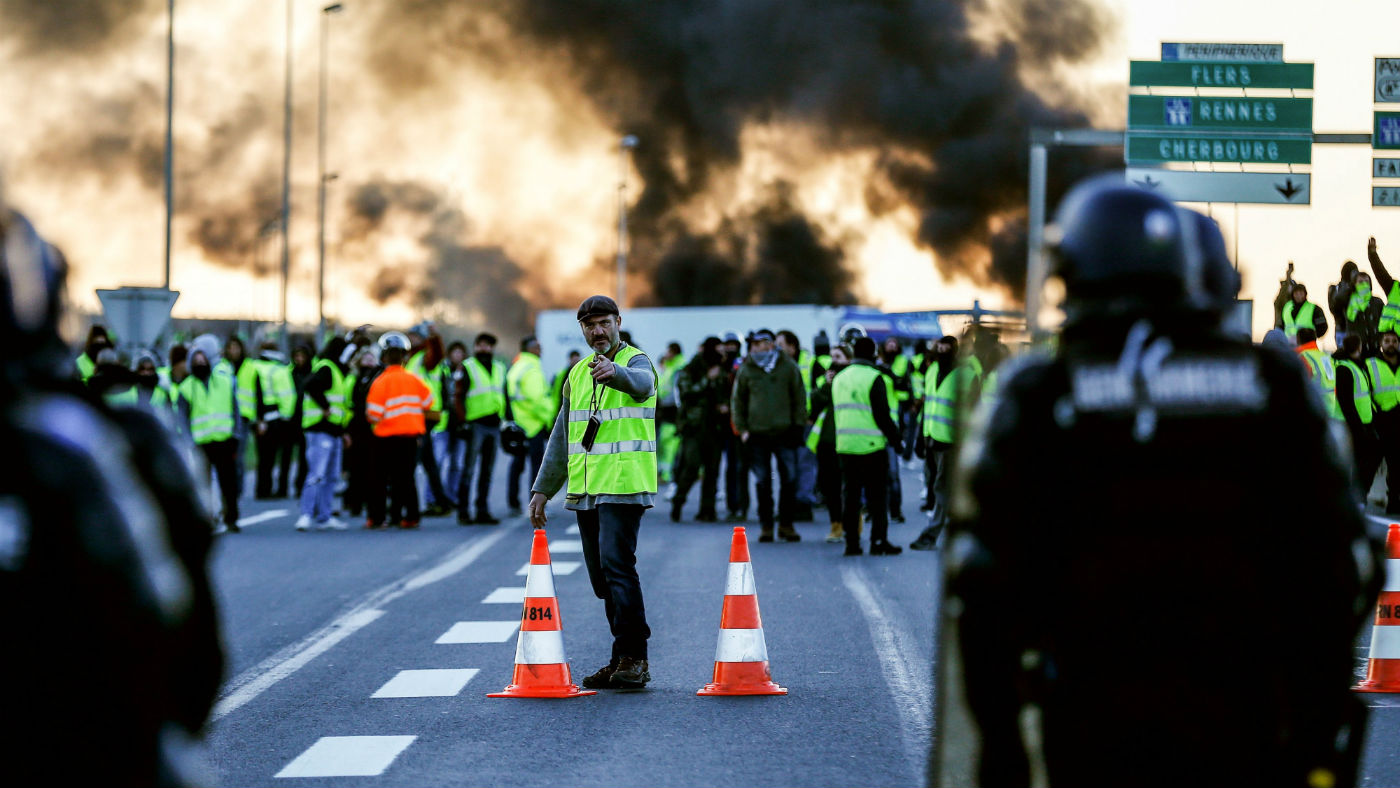One dead and hundreds injured in French fuel protests
Nationwide demonstrations reveal wider crisis of confidence in Emmanuel Macron’s centrist policies

A free daily email with the biggest news stories of the day – and the best features from TheWeek.com
You are now subscribed
Your newsletter sign-up was successful
French protests over rising fuel prices have left hundreds of people injured and one dead after demonstrations spilled into a second day.
The "yellow vests" movement, named for the high-visibility jackets worn by supporters, erupted on social media last month with calls for blockades of roads and highways in protest at rising fuel prices.
The French interior ministry estimates almost 300,000 people across 2,000 locations took part in Saturday’s demonstration.
The Week
Escape your echo chamber. Get the facts behind the news, plus analysis from multiple perspectives.

Sign up for The Week's Free Newsletters
From our morning news briefing to a weekly Good News Newsletter, get the best of The Week delivered directly to your inbox.
From our morning news briefing to a weekly Good News Newsletter, get the best of The Week delivered directly to your inbox.
The Local reports that “although most of the blockades were carried out without incident, tempers flared at times as some drivers confronted the protesters or tried to force their way through”.
Of the 409 injured, 28 are members of the police and fire brigade, said Christophe Castaner, the interior minister.
“Last night was restive... There were assaults, fights, stabbings,” Castaner told RTL radio. “There were fights among ‘yellow vest’ protesters. There was a lot of alcohol at certain venues, which led to this idiotic behaviour.”
At least 300 people were questioned by police and 157 taken into custody.
A free daily email with the biggest news stories of the day – and the best features from TheWeek.com
The worst incident on Saturday saw one protester accidently killed when a driver surrounded by demonstrators panicked and accelerated into the crowd.
In Paris, protesters partially blocked the Champs Elysees in the heart of the French capital before marching on the presidential Elysee Palace.
Reporting from Paris, Al Jazeera’s Neave Barker said violent clashes broke out between the police and protesters, during which the security forces used tear gas.
Discontent centres around the impact of new “green taxes” that have seen the price of diesel, the most commonly used fuel in French cars, rise by around 23% over the past 12 months to its highest point since the early 2000s, AFP news agency reports.
Rising global oil prices have been partly to blame, but most of the anger is directed towards Emmanuel Macron’s government which has raised its hydrocarbon tax this year by 7.6 cents per litre on diesel and 3.9 cents on petrol, as part of a campaign for cleaner cars and fuel.
Macron came to power last year vowing to overhaul the economy and he has argued the price hikes are needed to wean people off fossil fuels, but “many French see the fuel hikes as emblematic of Macron’s presidency, which they view as disconnected from day-to-day economic difficulties and designed to help the rich”, says the Daily Telegraph.
The BBC says “support for the protests appears broad”. Nearly three-quarters of respondents to a poll by the Elabe institute backed the Yellow Vests and 70% wanted the government to reverse the fuel tax hikes.
This stands in stark contrast to Macron’s personal approval ratings, which currently stand at just 25%, according to a poll by research group Ifop published on Sunday in the Journal du Dimanche.
In a TV interview last week, the president admitted he had “not succeeded in reconciling the French with their leaders" and that "we have probably not given them enough consideration”.
The government has announced a series of measures to try to quell the anger over fuel prices, including energy subsidies and higher bonuses towards cleaner vehicles, but Macron appears intent on continuing to raise fuel prices, which are set to increase again in January.
-
 How corrupt is the UK?
How corrupt is the UK?The Explainer Decline in standards ‘risks becoming a defining feature of our political culture’ as Britain falls to lowest ever score on global index
-
 Best places to find snowdrops in the UK
Best places to find snowdrops in the UKThe Week Recommends The snowdrop season is upon us, with ‘blankets’ of the beautiful bloom signalling that spring is on its way
-
 The 8 best superhero movies of all time
The 8 best superhero movies of all timethe week recommends A genre that now dominates studio filmmaking once struggled to get anyone to take it seriously
-
 Epstein files topple law CEO, roil UK government
Epstein files topple law CEO, roil UK governmentSpeed Read Peter Mandelson, Britain’s former ambassador to the US, is caught up in the scandal
-
 Iran and US prepare to meet after skirmishes
Iran and US prepare to meet after skirmishesSpeed Read The incident comes amid heightened tensions in the Middle East
-
 Israel retrieves final hostage’s body from Gaza
Israel retrieves final hostage’s body from GazaSpeed Read The 24-year-old police officer was killed during the initial Hamas attack
-
 China’s Xi targets top general in growing purge
China’s Xi targets top general in growing purgeSpeed Read Zhang Youxia is being investigated over ‘grave violations’ of the law
-
 Panama and Canada are negotiating over a crucial copper mine
Panama and Canada are negotiating over a crucial copper mineIn the Spotlight Panama is set to make a final decision on the mine this summer
-
 Why Greenland’s natural resources are nearly impossible to mine
Why Greenland’s natural resources are nearly impossible to mineThe Explainer The country’s natural landscape makes the task extremely difficult
-
 Iran cuts internet as protests escalate
Iran cuts internet as protests escalateSpeed Reada Government buildings across the country have been set on fire
-
 US nabs ‘shadow’ tanker claimed by Russia
US nabs ‘shadow’ tanker claimed by RussiaSpeed Read The ship was one of two vessels seized by the US military